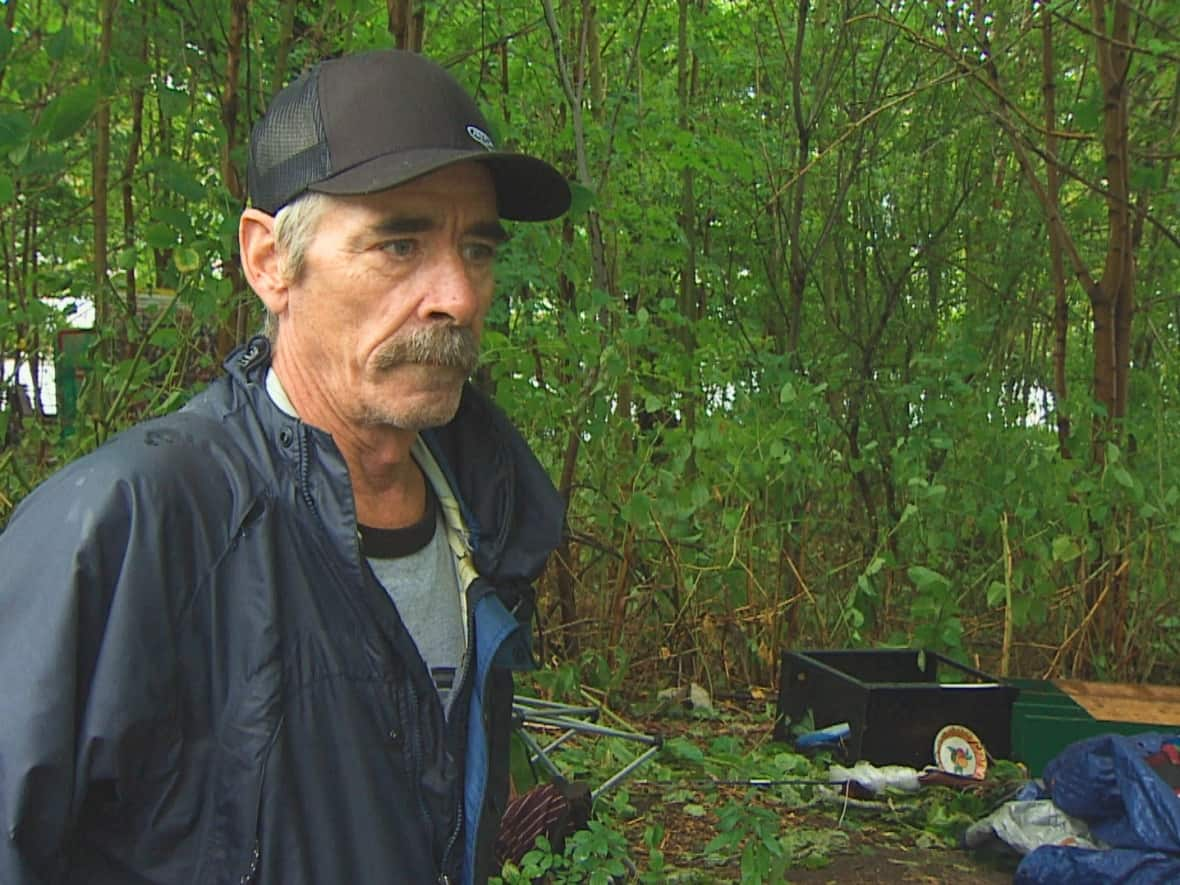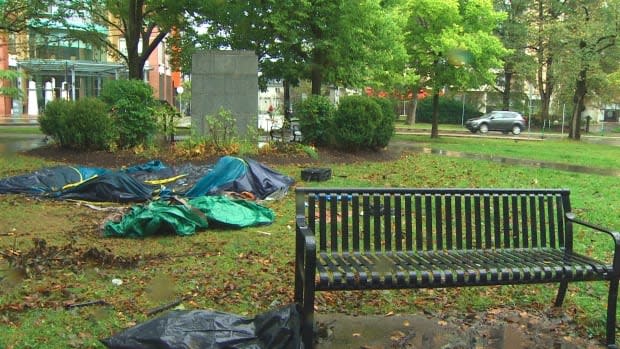Unhoused people in N.S. saw camps, belongings 'obliterated' by Fiona

Allan DeYoung spent the days after post-tropical storm Fiona sifting through tarps and tent poles, cleaning up the debris from a tent left behind by a young woman who lived next to him.
DeYoung counts himself as one of the luckier people living rough. He stays in a well-kept small wooden shelter with a locking door and window, tucked away in the woods in Dartmouth.
He stayed dry and safe through the storm, but some of the people who were tenting near him in the wooded area lost everything.
"So after the storm ... I come over to check on her and the whole place was flattened. Just the way the wind come down from the north, come over there and just obliterated everything," DeYoung said. "So I haven't seen her since."
He said the woman left almost everything she owned when she sought shelter from the storm.
"Dog food, knives, forks. Obviously you can look around, you see the clothes, which are ruined, you can't salvage them." DeYoung said.
"And I didn't even go through the tent. I just crushed everything, folded it up.... There's so much water in that right now, I can't drag it out here, I can't. Not by myself."
Challenging weekend
Unhoused people across the province were left vulnerable to Fiona's strong winds and rain. Some were able to shelter inside through the worst of the storm, but many had to leave their camps and everything in them.
Campbell McClintock, a street outreach worker with Halifax's Out of the Cold Community Organization, said he and his colleagues spent the weekend going through the city's parks.
"We were just seeing tents totally upended, flipped around and things all over the place," McClintock said. "It's not good to live outside anytime of year, and especially not during a hurricane."

Halifax opened an emergency shelter for unhoused people in Dartmouth from Friday to Monday. According to the city, approximately 92 people stayed there.
Another shelter was opened in Lower Sackville. Volunteers said 22 people stayed there.
But McClintock said some people had to stay outside.
"That environment in general where there's a lot of people in a big open area, that can be retraumatizing for a lot of folks who have had rough experiences on the street and in shelters," McClintock said.
"So while it's great that the city was able to mobilize shelter at the last minute, unfortunately it's not a sufficient option for everybody living outside, and going forward we need to see much better protocol in place to support everybody to have a safe option."

In Cape Breton, one of the areas hit hardest by the storm, entire communities mobilized to get people off the streets.
Sydney's Ally Centre saw staff volunteer their time in order to stay open all day and night on Friday and Saturday so people would have a place to go if the city's shelter was full.
"I think the storm and how bad it was took everybody by surprise. Not just those that were unhoused, but everybody," said Christine Porter, the Ally Centre's executive director.
"And when they walked through our doors and the cots were set up, one young woman said, 'I haven't felt this safe in a long time'."
But Porter said the Ally Centre hasn't had power for days and can't give people much more than a roof over their head and a hot cup of coffee. She said most people are now back out on the street, though some of their tents were destroyed.
"We don't have enough tents [to give out] and it's raining out really hard again and ... it's scary."

Even without power and communications, New Glasgow's Pictou County Roots For Youth sheltered eight youth during the storm, and found community placements for 11 more.
"There was a lot of fear around if something happened to the shelter where they would go from there," said Devonlynn Mirkovic-Riley, the executive director of the organization that supports youth aged 16 to 24.
"Because even when you aren't living with us, we're kind of their sense of safety and security. So there was a lot of fear about damage to the actual building ... and staff getting hurt."
Starting over
Mirkovic-Riley said most of the youth are now starting over with nothing.
"There has been a lot of loss for all of the youth that were rough sleeping. One of them was able to kind of stash a tent under a deck somewhere in the community, and so their stuff was wet but OK. But several of them lost all of their belongings."
She said Pictou County Roots for Youth is looking for donations of survival basics like tents, sleeping bags, warm clothes, and food storage. The organization also lost close to $3,000 in fresh food.
McClintock said panic-buying ahead of storms can make it difficult for unhoused people to access new supplies.
"In preparation for these storms, a lot of people buy out the shelves of all the important outdoor survival gear that you would ever need, so that's definitely something that affects people living outside."
More housing needed, fast
Porter said the destruction brought on by Fiona is a harsh reminder of the housing and homelessness crisis in all areas of the province.
"I know there's plans in the works for supportive housing here and harm reduction-based supportive housing here in Cape Breton ... but that's going to take some time," she said. "It's not happening fast enough."
She said since multiple buildings lost roofs, hundreds of people are suddenly homeless and there aren't enough supports.
"I don't know what to tell people because we are in the midst of a housing crisis, and now it's just grown to a different proportion."
McClintock said he's worried about what's to come for the growing numbers of unhoused people as the weather grows colder.
MORE TOP STORIES


